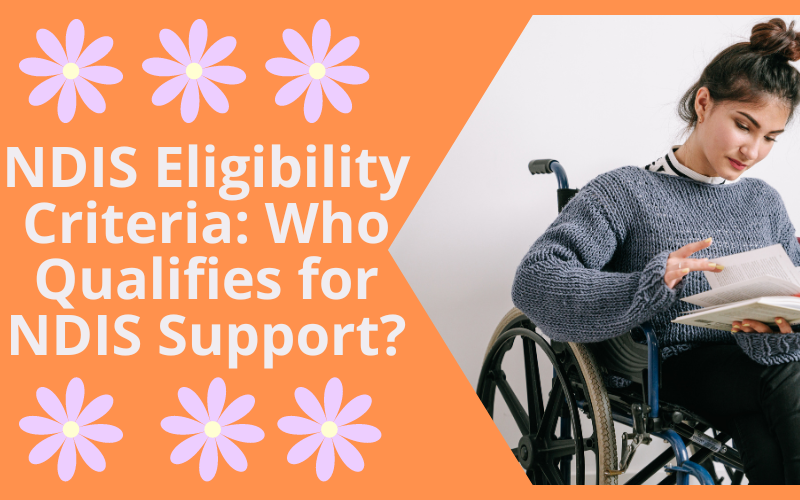38 Dallington crescent Balga WA 6061

NDIS Eligibility Criteria: Who Qualifies for NDIS Support?
Comprehensive support and services are provided to individuals with disabilities in Australia through the National Disability Insurance Scheme (NDIS). By providing customised assistance, promoting independence, and improving the overall quality of life, this program aims to empower individuals with disabilities and is funded by the government.
To address the different needs of individuals with physical, intellectual, sensory, and psychosocial disabilities, the NDIS offers personalised care. The NDIS promotes a more inclusive society where people with disabilities can fully participate in their communities by offering resources, funding, and access to services.
They can enjoy rewarding lives. The NDIS continues to significantly impact countless lives as it remains a cornerstone of Australia’s commitment to disability support. Meeting specific eligibility criteria is necessary for individuals to access NDIS support. Here will cover the eligibility criteria for NDIS and who is eligible for NDIS support.
1. Age and Residence Requirements
To receive NDIS support, individuals must fulfil specific age and residency requirements. Outlined below are the essential points about age and residence:
Those who can seek NDIS support fall within the age range of 7 to 65. If you are within these specific age ranges, seeking guidance from a local area coordinator can help you comprehend the NDIS and submit an application for support.
You can also connect with additional government and community services. An early childhood partner can assist and evaluate if the NDIS is appropriate for children aged 7 or younger.
To access NDIS benefits and services, one must meet the eligibility requirements as an Australian citizen, a permanent resident or hold a Protected Special Category Visa. Furthermore, residing in Australia and considering it your home is required.
2. Disability Requirements
Assessing whether an individual meets the disability requirements helps the NDIS determine eligibility. The disability requirements include these key aspects:
- An impairment can cause a disability, possibly due to birth, disease, injury or accident.
- The impairment must be considered permanent, indicating it is not anticipated to improve significantly over time.
- In various domains like mobility, communication, socialising, learning, self-care, self-management and participation in community life, the individual’s functional capacity is likely to be significantly reduced by the permanent impairment.
- The ability of the individual to work, study, or participate in social activities will be impacted by permanent impairment.
- Support for the individual’s whole life is typically required in the long term. If someone is diagnosed with one or more conditions specified in either List A or List B, they will probably fulfil the disability criteria.
3. Early Intervention Requirements
The NDIS recognises the importance of early intervention to minimise the need for long-term support. If you require support now to reduce your future need for assistance, you may be eligible for the NDIS. Similarly, if your family requires support to build their skills to assist you, you may also meet the criteria for NDIS eligibility.
4. List A and List B Conditions
The NDIS presents a roster of medical conditions that are probable to result in lasting disability. These conditions can aid in determining eligibility for NDIS support. Included in these conditions are a few examples:
Intellectual disability
- Conditions on the autism spectrum, like autism and Asperger’s syndrome
- Hemiparesis and severe emphysema are some of the permanent physical impairments.
Remember, this list is not exhaustive, and several other conditions may entitle someone to NDIS support.
Types of support in NDIS
The NDIS offers financial assistance to qualified individuals, catering to their specific requirements. The NDIS funds various types of support that can be classified into different categories and budgets. The NDIS offers various main types of support:
Core Supports
Core Supports help participants to complete daily living activities and achieve their goals. This category contains supports like help with everyday tasks, items that are used up, transportation, and getting involved in social activities and community events.
Capital Supports
Capital Supports are targeted towards investments like assistive technologies, equipment, home modifications, and vehicle modifications. In addition to other expenses, this category provides funding for capital costs like Specialist Disability Accommodation.
Capacity Building Supports
Capacity Building Supports primarily concentrate on enabling participants to develop their independence, skills, and capabilities. These supports aid people in unlocking their potential and reaching their long-term goals. Capacity-building supports include coordination support, support related to employment, support for therapy, and training for carers.
Disability-related Health Supports
The specific health-related needs of participants are addressed through disability-related health supports. These tasks may involve support delegated by a registered nurse and vary based on the required complexity and number of tasks.
Informal Supports
The NDIS understands the value of informal support offered by family members and carers. Meeting the needs and well-being of participants requires sustaining informal support, including the capacity of family members to provide ongoing care.
The main types of support available under the NDIS include. The NDIS aims to assist individuals in leading independent lives, accomplishing their objectives, and fully engaging in their communities.
Conclusion
The NDIS supplies indispensable aid and services to individuals with disabilities in Australia. To access NDIS support, individuals must fulfil specific eligibility criteria. The criteria comprise age and residence requirements, alongside meeting the disability or early intervention requirements.
The individual’s life must be significantly impacted by the permanent impairment, which should substantially reduce their functional capacity. Moreover, having certain medical conditions listed under List A and B that lead to a permanent impairment may make individuals eligible for NDIS support.
If you believe that you or somebody you know satisfies all of the eligibility requirements, then contacting NDIS and consulting healthcare experts would be a good idea for initiating your application.
As an NDIS service provider, Achieve Disability Care can assist you in navigating the NDIS process. We can provide support planning, assistance with daily living activities, disability employment services, community participation programs, recreational activities, personal activities assistance, travel transport assistance, and development and support for life skills.
